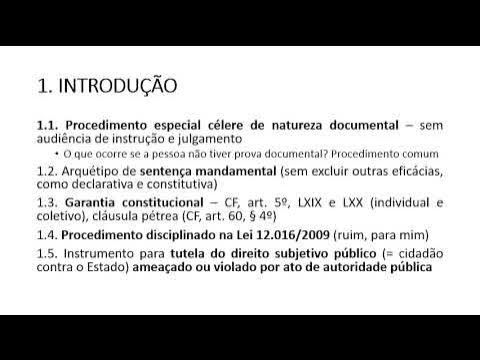CF/88 - Art. 29 (Leis Orgânicas)
Summary
TLDRThis video lecture covers the constitutional aspects of Brazilian municipalities, particularly focusing on the legislative process for their organic laws (leis orgânicas). It explains that municipalities are governed by these laws, which must be approved by the Municipal Chamber in two rounds with a 2/3 majority and a 10-day interval between rounds. The lecture emphasizes that the Municipal Chamber is responsible for both the approval and promulgation of these laws, with no involvement from the mayor in the process. It also discusses the principle of symmetry, which ensures consistency in legislative processes across federal, state, and municipal levels.
Takeaways
- 😀 Municipalities are governed by organic laws, not constitutions.
- 😀 Municipal organic laws are approved by the municipal chamber with a 2/3 majority in two rounds of voting.
- 😀 There must be a minimum 10-day interval between the first and second rounds of voting for a municipal organic law.
- 😀 Once a municipal organic law is approved, it is promulgated by the municipal chamber, not the mayor.
- 😀 There is no veto or sanction power by the mayor over municipal organic laws or amendments.
- 😀 The mayor can only propose changes to the organic law, but the chamber decides whether to approve them.
- 😀 The principle of symmetry ensures that the process for amending municipal organic laws follows a similar pattern to constitutional amendments at the federal and state levels.
- 😀 The process for altering a municipal organic law involves a 2/3 majority in both rounds, with no mayoral veto power.
- 😀 The municipal chamber plays a central role in both the approval and promulgation of municipal organic laws.
- 😀 The text of Article 29 of the Constitution contains essential information about the process for municipal organic law creation and amendment, and it is commonly tested in exams.
Q & A
What is the role of the organic law for municipalities in Brazil?
-Municipalities in Brazil are governed by an organic law, which functions similarly to a constitution but is not called one. It regulates the local government and must be voted on in two rounds with a minimum interval of 10 days between votes.
What is the required majority for the approval of an organic law in a municipality?
-An organic law in a municipality must be approved by a two-thirds majority of the members of the municipal chamber, and the law must be voted on in two separate rounds.
Who promulgates the organic law of a municipality?
-The organic law of a municipality is promulgated by the municipal legislative body, specifically the municipal chamber. There is no role for the mayor in the promulgation process.
Can the mayor veto or sanction an organic law in a municipality?
-No, the mayor cannot veto or sanction an organic law. The organic law is approved and promulgated by the municipal chamber, and there is no involvement of the executive branch in this process.
What does the principle of symmetry in constitutional law refer to in the context of the municipalities?
-The principle of symmetry refers to the requirement that the process for altering the municipal organic law should follow the same principles and procedures found in the alteration of state constitutions or the Federal Constitution, with due adaptations.
How does the legislative process for a municipal organic law compare to the process for a state constitution or Federal Constitution?
-While there are differences in specific requirements (e.g., majority percentages), the legislative process for changing the organic law of a municipality follows the same basic principles as for changing a state constitution or the Federal Constitution, such as requiring a two-thirds majority and the involvement of the legislative body for approval and promulgation.
What is the minimum interval between voting rounds for a municipal organic law?
-The minimum interval between the two voting rounds for a municipal organic law is 10 days.
What happens after a proposal for an amendment to a municipal organic law is approved by the municipal chamber?
-Once an amendment to the municipal organic law is approved by the municipal chamber in two rounds, it is not sent to the mayor for sanction or veto. Instead, it is directly promulgated by the chamber.
Why is the concept of a 'municipal organic law' important in Brazilian constitutional law?
-The concept of a 'municipal organic law' is important because it provides the legal framework for the governance of a municipality, specifying how laws are made and amended, and ensuring the independence and sovereignty of municipalities within the broader context of the Brazilian legal system.
What are some common topics tested in exams related to the municipal organic law?
-Common topics include the legislative process for creating and amending organic laws, the required majority for approval, the involvement of the municipal chamber in the promulgation process, and the concept of the principle of symmetry with state and federal constitutions.
Outlines

This section is available to paid users only. Please upgrade to access this part.
Upgrade NowMindmap

This section is available to paid users only. Please upgrade to access this part.
Upgrade NowKeywords

This section is available to paid users only. Please upgrade to access this part.
Upgrade NowHighlights

This section is available to paid users only. Please upgrade to access this part.
Upgrade NowTranscripts

This section is available to paid users only. Please upgrade to access this part.
Upgrade NowBrowse More Related Video

[EV.G] Introdução ao Processo Legislativo Municipal - Espécies Normativas

Veto / Leis Delegadas (arts. 66 a 69) Leitura da CF atualizada e comentada

MANDADO DE SEGURANÇA 1

Estrutura e Organização do Estado Brasileiro | Direito Constitucional | Adriane Fauth

DIREITO CONSTITUCIONAL - DIREITOS INDIVIDUAIS (ART 5) - AULA 1

Prof. Dr. Wicipto Setiadi, S.H., M.H. - SUMBER HUKUM (1)
5.0 / 5 (0 votes)